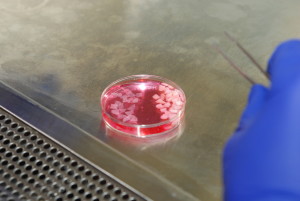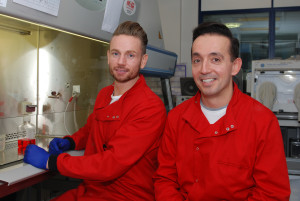Researchers at the University of Huddersfield are the first to arrive at a deep understanding of a molecule that destroys cancerous tumours without harming healthy cell tissue. The discovery, which has been patented, opens the doors for a highly effective cancer treatment.
A journal article describes the science behind the breakthrough. The research team headed by Dr Nikolaos Georgopoulos has developed and patented a cancer treatment regime that exploits the unique properties of the molecule – a protein named Cluster of Differentiation 40 (CD40). The next phase is to secure funding for clinical trials.
Targeting tumour cells

Tumour cells proliferate by continuously dividing. This places them under considerable stress, but they have developed protective properties that enable them to cope. CD40 removes this protection so that the tumour cells die, but because normal cells are not placed under “oxidative stress” they are unharmed by the protein.
It was vital to understand these remarkable properties of CD40, with their immense potential for cancer therapy. Years of investigation began to unlock the mystery.
Cancer therapies, such as chemotherapy and radiotherapy, usually have side effects and healthy cells are destroyed along with cancerous cells.
Dr Georgopoulos and his co-researchers at the University of Huddersfield made this discovery because instead of working purely with tumour cells, they were able to make comparisons with the effects of CD40 on normal cells as well as engineered – para-malignant – cells that allowed them to mimic the process of carcinogenesis – cancer development. They have now identified exactly why this molecule can kill tumour cells and why it leaves normal cells unaffected.
Future cancer treatment

The team has also worked on a method of using CD40 in targeted, intravenous bio-therapy by discovering the best way to deploy the molecule. The discovery has been patented, and the University is exploring commercialisation through a spin-out company – provisionally called ThanatoCure™ – Thanatos is the Greek word for ‘death’, referring here to cell death.
Advanced discussions are being held with a company that specialises in early-stage development of innovative cancer therapies. It is hoped that the company will secure funding in the region of £900,000 for clinical trials that would see colorectal cancer patients receiving the new treatment. The trials could start as early as the end of 2017.
A big proportion of research leading to the breakthrough was conducted by Dr Chris Dunnill, during and beyond his PhD, supervised by Dr Georgopoulos. Also part of the research team – and co-contributors to the new article in a leading journal – were PhD students Khalidah Ibraheem and Albashir Mohamed, supervised by Dr Georgopoulos, and Professor Jenny Southgate from the Department of Biology, University of York.
- The article A redox state-dictated signalling pathway deciphers the malignant cell specificity of CD40-mediated apoptosis is in the journal, Oncogene.

Spotlight
Dr Nik Georgopoulos
Dr Nik Georgopoulos is a Reader in Cell Biology and has expertise in cancer biology and immunology. A major part of Nik’s research focuses on understanding how the process of cancer development in human cells changes not only their ability to grow/divide and to invade other parts of the body, but particularly how cancer cells respond to cell death ‘signals’ transmitted in cells by Tumour Necrosis Factor Receptor proteins, such as the protein CD40. His aim is to use such biological knowledge to design novel therapies that specifically kill tumour cells. To find out more about the research in this article, please contact Dr Nikolaos Georgopoulos, email: n.georgopoulos@hud.ac.uk
Spring 2017 Issue
Return to the home page for the Spring 2017 Issue of Discover.
Spring 2017 Issue
Return to the home page for the Spring 2017 Issue of Discover.
